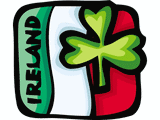
ROBERT EMMET - NATIONALIST AND ORATOR By Kevin Kelly
~~~~~~~~~~~~~~~~~~~~~~~~~~~~~~~~~~~~~
Robert Emmet's short, dramatic life came to a tragic end
on
September 20, 1803. However, although his life was short
and his struggle in vain, his efforts, vision and idealism
left a mythic mark on Irish and on the world history.
Born in Dublin in 1778 into a fairly-well-to-do Protestant
family, Emmet was educated at Trinity College, Dublin. With
high ideals of fraternity and equality, Robert, like his
elder brother Thomas, became involved with the United
Irishmen, an organization formed in 1791 by Wolfe Tone,
James Tandy, and Thomas Russell to achieve Roman Catholic
emancipation and, with Protestant cooperation,
parliamentary reform.
From 1800 to 1802, Emmet resided on the continent with
leaders of the United Irishmen who had been exiled from
Ireland following the rebellion of 1798. While there, Emmet
attempted to enlist French support for an insurrection
against British rule. With the promise of French military
aid secured, Emmet returned to Ireland in 1802 and began to
organize and arm the country in preparation for the French
landing. However, Emmet's hand was forced in July 1803 when
an explosion at one of his arms depot's compelled an early
call for insurrection on July 23. His plan now awry, the
ill-timed insurrection ended in confusion as various
factions failed to receive or failed to heed the call to
arms, and the promised French invasion failed to materialize.
Determined and undaunted Emmet, wearing a green and white
uniform, marched a small band against Dublin Castle. On
their way, the group happened upon Lord Kilwarden, the Lord
Chief Justice and his nephew. Emmet's followers seized them
from their coach, piked them to death and then began to riot
in the streets. Disillusioned by his followers' behavior and
realizing the cause was lost, Emmet escaped and hid in the
Wicklow Mountains.
From there, Emmet moved to Harold's Cross to be near Sarah
Curran, his bride-to-be (Thomas Moore's songs, 'She is far from
the land where her young hero sleeps' and 'Oh breathe not
the name' were inspired by Emmet's love for her). Emmet had
hoped to escape to America but was captured on August 25,
1803 and imprisoned at Kilmainham. He was tried for high
treason in Green Street Courthouse where he was sentenced
to be hanged, drawn and quartered.
When asked if he had any thing to say in response to this
sentence, Emmet gave what is considered to be one of the
most famous speeches of the period. Emmet's speech to the
court (The Speech from the Dock) could be regarded as
the last protest of the United Irishmen:
' I have but one request to ask at my departure from this
world – it is the charity of its silence. Let no man write
my epitaph. No man can write my epitaph, for as no man who
knows my motives and character dares now to vindicate them,
let not prejudice or ignorance asperse them. Let them rest
in obscurity and peace until other times and other men can
do justice to them. When my country takes her place among
the nations of the earth, then shall my character be
vindicated, then may my epitaph be written'.
Although he held out hope for a rescue, on September 20,
1803, he was executed. Out of deference to his aristocratic
background, Emmet was hanged and beheaded but was not
subsequently disemboweled - as such a sentence usually
involved. His burial site remains a mystery to this date.
In 2003, Ireland and the world will remember the 200th
anniversary of Robert Emmet's death and will commemorate an
earlier period of history in which Irish Protestants and
Catholics were united under one banner. In remembering those
times, we can hope, pray and work for a modern era of
peace and equality in this land.
Ireland has indeed taken 'her place among the nations of
the
world'.
In preparation for the bicentennial of his death, information
about Robert Emmet currently is being gathered on the internet
at http://www.RobertEmmet.org
~~~~~~~~~~~~~~~~~~~~~~~~~~~~~~~~~~~~~~~~~~~~~~~~~~~~~~~~~~
(C) Copyright The Information about Ireland Site, 2000
The Leader in Free Resources from Ireland
Free Irish coats of arms, screensavers, maps and more
http://www.ireland-information.com
~~~~~~~~~~~~~~~~~~~~~~~~~~~~~~~~~~~~~~~~~~~~~~~~~~~~~~~~~~


